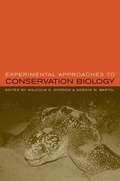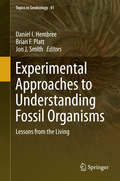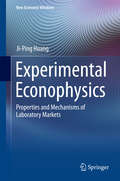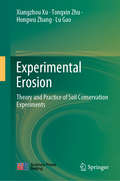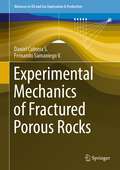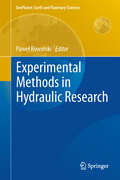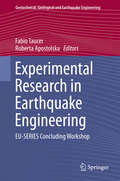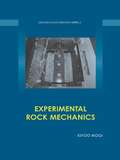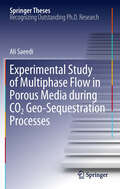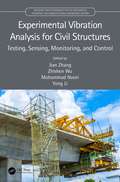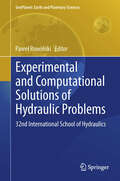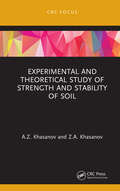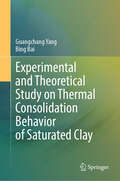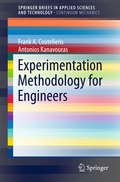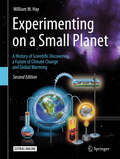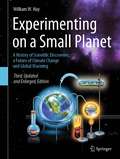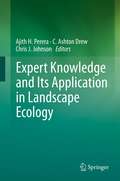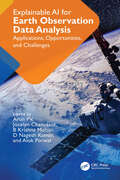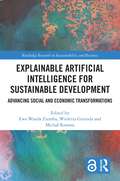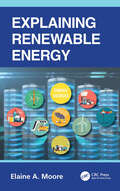- Table View
- List View
Experimental Approaches to Conservation Biology
by Malcolm S. Gordon Soraya M. BartolEnvironmental and biological researchers from around the world present a selection of current case studies relevant to protecting world biodiversity that illustrate issues in both basic and applied experimental biology, at a level accessible to students and non scientists as well as active researcher. The also want to raise the visibility of organism-centered experimentation as a valid and useful approach to conservation biology, and to narrow the gap that divides researchers from managers and policymakers charged with protecting biodiversity. The 18 selected papers were to be presented a September 2001 conference in Los Angeles, but some were not delivered because air traffic was closed and authors could not reach Los Angeles. Annotation ©2004 Book News, Inc., Portland, OR (booknews.com)
Experimental Approaches to Understanding Fossil Organisms
by Daniel I. Hembree Brian F. Platt Jon J. SmithPaleontologists and geologists struggle with research questions often complicated by the loss or even absence of key paleobiological and paleoenvironmental information. Insight into this missing data can be gained through direct exploration of analogous living organisms and modern environments. Creative, experimental and interdisciplinary treatments of such ancient-Earth analogs form the basis of Lessons from the Living. This volume unites a diverse range of expert paleontologists, neontologists and geologists presenting case studies that cover a spectrum of topics, including functional morphology, taphonomy, environments and organism-substrate interactions.
Experimental Econophysics
by Ji-Ping HuangExperimental Econophysics describes the method of controlled human experiments, which is developed by physicists to study some problems in economics or finance, namely, stylized facts, fluctuation phenomena, herd behavior, contrarian behavior, hedge behavior, cooperation, business cycles, partial information, risk management, and stock prediction. Experimental econophysics together with empirical econophysics are two branches of the field of econophysics. The latter one has been extensively discussed in the existing books, while the former one has been seldom touched. In this book, the author will focus on the branch of experimental econophysics. Empirical econophysics is based on the analysis of data in real markets by using some statistical tools borrowed from traditional statistical physics. Differently, inspired by the role of controlled experiments and system modelling (for computer simulations and/or analytical theory) in developing modern physics, experimental econophysics specially relies on controlled human experiments in the laboratory (producing data for analysis) together with agent-based modelling (for computer simulations and/or analytical theory), with an aim at revealing the general cause-effect relationship between specific parameters and emergent properties of real economic/financial markets. This book covers the basic concepts, experimental methods, modelling approaches, and latest progress in the field of experimental econophysics.
Experimental Erosion: Theory and Practice of Soil Conservation Experiments
by Xiangzhou Xu Tongxin Zhu Hongwu Zhang Lu GaoThis book is the first to systematically explore experimental erosion by integrating theory, erosion observations, and conservation applications. Although numerous books have been published on soil erosion both in English and in Chinese, none has concentrated on experimental studies on the Loess Plateau of China, in an attempt to establish a new sub-discipline: experimental erosion. One main objective of this book is to highlight monitoring and modeling methods for soil scientists who design and conduct experimental studies on soil loss. Another objective, and the most important one, is to make the results of these experiments more generally available. Accordingly, we have gathered and integrated a broad range of experimental results, both published and unpublished. In-depth discussions of the experimental data and new data processing methods are also included. The work covered here represents exemplary studies in the field of soil erosion and conservation, while the new methods and findings presented will provide practical guidance for controlling soil erosion. Hence the book offers a valuable resource for graduate students, soil erosion scientists and engineers, and soil and water conservationists.
Experimental Mechanics of Fractured Porous Rocks (Advances in Oil and Gas Exploration & Production)
by Daniel Cabrera S. Fernando Samaniego V.The book offers novel petrophysical methods for obtaining and characterizing physical properties of sandstone and fractured carbonate rocks. The proposed experimental petrophysical test for the determination of permeability tensor ellipses in fractured rocks at a laboratory scale is a methodology of easy application and does not require complicated equipment. Such a test can be extended with 3D digital petrophysics. The estimation of principal permeability directions is useful in the realization of immiscible or miscible displacements in the rock. This book is of interest for professionals and researchers in the field of petrophysics and oil and gas exploration.
Experimental Methods in Hydraulic Research
by Paweł RowińskiIt is clear that hydraulic research is developing beyond traditional civil engineering to satisfy increasing demands in natural hazards assessment and also environmental research. Our ability to describe processes in nature rests on the observation and experimental methods as well as on theoretical basics of various disciplines. Under such conditions experimental methods draw from various areas of human activities and research, i.e. from physics, biology, chemistry, aerospace research, oceanic research etc. The current volume is the result of a meeting that took place during the 30th International School of Hydraulics in Poland and presents both the state-of-the-art and ongoing research projects in which experimental methods play a key role. Authors from numerous leading laboratories and from various countries guarantee a representative sample of different studies at the frontier of the field
Experimental Physics Compact for Scientists: Mechanics, Thermodynamics, Electrodynamics, Optics & Quantum Physics
by Sebastian SlamaThis book compactly provides the fundamentals of experimental physics for students of the natural sciences who are taking physics as a minor or major subject. Interspersed throughout the main text are numerous exercises with pre-calculated solutions, and the most important formulas are listed again at the end of each chapter. This book enables readers to gain an overview of the individual areas and is thus ideally suited to accompany lectures during studies as well as for exam preparation.The textbook originated from a lecture on "Experimental Physics for Natural Scientists" at the University of Tübingen and is intended for all students in subjects such as biochemistry, bioinformatics, biology, chemistry, computer science, mathematics, pharmacy, geoecology, and earth sciences.The first part of the book deals with Newtonian mechanics including continuum mechanics and oscillations and waves. The second part deals with the basic concepts of thermodynamics with emphasis on the statistical explanations. The third part covers electromagnetic phenomena, especially electrostatics and magnetostatics, electrodynamics, and an introduction to electronic components and circuits. Optics with its subfields, ray optics, wave optics, and quantum optics, is presented in the fourth part. In the fifth and last part of the book, the reader is given an overview of the basic principles of quantum mechanics, including atomic and nuclear physics. For this second edition, the content has been improved and supplemented in many places, including a new section on heat transport and phase transitions, as well as an outlook into alternative interpretations of quantum mechanics.
Experimental Research in Earthquake Engineering
by Fabio Taucer Roberta ApostolskaIn this volume, top seismic experts and researchers from Europe and around the world, including the George E. Brown, Jr. Network for Earthquake Engineering Simulation (NEES) in the USA, present the most recent outcome of their work in experimental testing, as well as the results of the transnational access activities of external researchers who have used Europe's seven largest and most advanced seismic testing facilities in the framework of the Seismic Engineering Research Infrastructures for European Synergies (SERIES) Project financed by the European Commission in its 7th Framework Programme (2007-2013). This includes EU's largest reaction wall facility, EU's four largest shaking table laboratories and its two major centrifuges. The work presented includes state-of-the-art research towards the seismic design, assessment and retrofitting of structures, as well as the development of innovative research toward new fundamental technologies and techniques promoting efficient and joint use of the research infrastructures. The contents of this volume demonstrate the fruits of the effort of the European Commission in supporting research in earthquake engineering.
Experimental Rock Mechanics (Geomechanics Research Ser. #3)
by Kiyoo MogiFracture and flow of rocks under stress and their geophysical and seismological implications raise fundamental questions in rock mechanics, particularly in the areas of tectonophysics and seismology. This text exclusively addresses the deformation and fracture of rock specimens under general triaxial compression, in which all three principal stress
Experimental Study of Multiphase Flow in Porous Media during CO2 Geo-Sequestration Processes
by Ali SaeediThere have been numerous computer-based simulation studies carried out on the subject of CO2 geo-sequestration. However, the amount of experimental data available in the literature on this topic, especially with regards to multiphase flow characteristics of fluid-rock systems during such processes, is very limited. This research was carried out with the aim of providing a better understanding of the multiphase fluid flow characteristics of fluid-rock systems during the geo-sequestration process. The ultimate goal of this research was to experimentally evaluate the change in a number of multiphase flow characteristics of the system over time caused by the potential chemical and physical/mechanical processes occurring during deep CO2 disposal. In order to achieve this goal the effects of cyclic/alternating CO2-brine flooding, flow direction, existence of residual hydrocarbon (natural gas) and change in the reservoir stress field on the system's multiphase flow behaviour were investigated. Until completion of this study there were no experimental data published in the literature addressing the above mentioned issues and the results obtained, and published within this thesis were the first of their kind.
Experimental Techniques in Modern High-Energy Physics: A Beginner‘s Guide (Lecture Notes in Physics #1001)
by Kazunori Hanagaki Junichi Tanaka Makoto Tomoto Yuji YamazakiThis open access book offers a concise overview of how data from large scale experiments are analyzed and how technological tools are used in practice, as in the search for new elementary particles. It focuses on interconnects between physics and detector technology in experimental particle physics, and includes descriptions of mathematical approaches. Readers find all the important steps in analysis, including reconstruction of the momentum and energy of particles from detector information, particle identification, and also the general concept of simulating particle production from collisions and detector responses. As the scale of scientific experiments becomes larger and data-intensive science emerges, the techniques used in the data analysis become ever more complicated, making it difficult for beginners to grasp the overall picture. The book provides an explanation of the idea and concepts behind the methods, helping readers understand journal articles on high energy physics. This book is engaging as it does not overemphasize mathematical formalism and it gives a lively example of how such methods have been applied to the Higgs particle discovery in the Large Hadron Collider (LHC) experiments, which led to Englert and Higgs being awarded the Nobel Prize in Physics for 2013.Graduate students and young researchers can easily obtain the required knowledge on how to start data analyses from these notes, without having to spend time in consulting many experts or digesting huge amounts of literature.
Experimental Vibration Analysis for Civil Structures: Testing, Sensing, Monitoring, and Control (Resilience and Sustainability in Civil, Mechanical, Aerospace and Manufacturing Engineering Systems)
by Jian Zhang, Zhishen Wu, Mohammad Noori, and Yong LiExperimental Vibration Analysis for Civil Structures: Testing, Sensing, Monitoring, and Control covers a wide range of topics in the areas of vibration testing, instrumentation, and analysis of civil engineering and critical infrastructure. It explains how recent research, development, and applications in experimental vibration analysis of civil engineering structures have progressed significantly due to advancements in the fields of sensor and testing technologies, instrumentation, data acquisition systems, computer technology, computational modeling and simulation of large and complex civil infrastructure systems. The book also examines how cutting-edge artificial intelligence and data analytics can be applied to infrastructure systems. Features: Explains how recent technological developments have resulted in addressing the challenge of designing more resilient infrastructure Examines numerous research studies conducted by leading scholars in the field of infrastructure systems and civil engineering Presents the most emergent fields of civil engineering design, such as data analytics and Artificial Intelligence for the analysis and performance assessment of infrastructure systems and their resilience Emphasizes the importance of an interdisciplinary approach to develop the modeling, analysis, and experimental tools for designing more resilient and intelligent infrastructures Appropriate for practicing engineers and upper-level students, Experimental Vibration Analysis for Civil Structures: Testing, Sensing, Monitoring, and Control serves as a strategic roadmap for further research in the field of vibration testing and instrumentation of infrastructure systems.
Experimental and Computational Solutions of Hydraulic Problems
by Paweł RowińskiWhat is the progress in hydraulic research? What are the new methods used in modeling of transport of momentum, matter and heat in both open and conduit channels? What new experimental methods, instruments, measurement techniques, and data analysis routines are used in top class laboratory and field hydro-environment studies? How to link novel findings in fundamental hydraulics with the investigations of environmental issues? The consecutive 32nd International School of Hydraulics that took place in Łochów, Poland brought together eminent modelers, theoreticians and experimentalists as well as beginners in the field of hydraulics to consider these and other questions about the recent advances in hydraulic research all over the world. This volume reports key findings of the scientists that took part in the meeting. Both state of the art papers as well as detailed reports from various recent investigations are included in the book
Experimental and Theoretical Advances in Fluid Dynamics
by Jaime Klapp Anne Cros Catalina Stern Mario Alberto Rodriguez Meza Oscar Velasco FuentesThe book is comprised of lectures and selected contributions presented at the Enzo Levi and XVI Annual Meeting of the Fluid Dynamic Division of the Mexican Physical Society in 2010. It is aimed at fourth year undergraduate and graduate students, as well as scientists in the fields of physics, engineering and chemistry with an interest in fluid dynamics from the experimental and theoretical point of view. The lectures are introductory and avoid the use of complicated mathematics. The other selected contributions are also geared to fourth year undergraduate and graduate students. The fluid dynamics applications include multiphase flow, convection, diffusion, heat transfer, rheology, granular material, viscous flow, porous media flow, geophysics and astrophysics. The material contained in the book includes recent advances in experimental and theoretical fluid dynamics and will be of great use to those involved in either teaching and/or research.
Experimental and Theoretical Study of Strength and Stability of Soil
by A.Z. Khasanov Z.A. KhasanovThis work presents the experimental results of the strength of sands and clay soils in the following conditions: plane shear, triaxial stress state, with passive and active loading. The obtained experimental results are compared with existing theories of strength and the reasons for their non-conformity are identified. Experimental data on the determination of the position of shear surfaces with active and passive resistance of soils is analysed. A new concept of the theory of soil strength is considered, which allows to take into account the fundamental parameters of the strength of soils: the angle of internal friction, specific adhesion, and lateral pressure ratio. Given analytical expressions allow one to determine the stress state at the sites rejected with respect to the main stresses. The definition of the physical essence of the concept of lateral pressure coefficient for soils is given. Also described are the results of experiments to determine the critical load on soil having the shape of a truncated cone, where the angles of deflection of the shear surfaces have been experimentally determined, on the basis of which analytical expressions have been obtained that allow prediction of the critical load. The book provides methods for solving various geotechnical problems using the theory of soil strength proposed by the authors. The book is intended for professionals working in the fields of soil mechanics and geotechnics, as well as for students and academics in engineering, earth and soil sciences and construction.
Experimental and Theoretical Study on Thermal Consolidation Behavior of Saturated Clay
by Guangchang Yang Bing BaiThis book presents a detailed study of the thermal consolidation behavior of saturated clay from experimental and theoretical aspects, analyzes the thermal consolidation response of saturated clay under the influence of different drainage conditions, confining pressures, temperature paths, and over-consolidation ratios, and carries out theoretical modelling of thermal consolidation based on thermoelasticity theory. The study of thermodynamic properties of clayey soils under temperature load has a wide range of applications in the fields of geothermal resource development, thermal energy storage, and nuclear waste disposal. This book provides an in-depth analysis of the thermal consolidation properties of saturated clay through systematic experimental studies and meticulous theoretical modelling. The relevant experimental results and theoretical analysis methods can provide valuable references for the study of soil thermal properties. This book is intended for graduate students and researchers in related fields such as geotechnical engineering, environmental engineering, soil science, as well as design engineers.
Experimentalphysik 1: Mechanik und Wärme (Springer-Lehrbuch)
by Wolfgang DemtröderDas vorliegende Lehrbuch zur Mechanik und Wärmelehre richtet sich an Studierende der Physik im ersten Semester. Die Vorlesungsinhalte werden hier anschaulich, übersichtlich und leicht verständlich in zwölf Kapiteln dargestellt: Das Buch beginnt mit der Mechanik des Massenpunktes, Bezugssystemen und spezielle Relativitätstheorie. Es werden Systeme von Massenpunkten und die Dynamik starrer ausgedehnter Körper behandelt. Anschließend wird das Verhalten von festen und flüssigen realen Körpern und Gasen diskutiert. Strömende Flüssigkeiten und Gase, Auftrieb und die Physik des Fliegens werden im nächsten Kapitel besprochen. Nach der Vakuum-Physik wird die Wärmelehre eingeführt. Das Buch endet mit mechanischen Schwingungen und Wellen, nichtlinearer Dynamik und Chaos. Für das Verständnis notwendige Teilaspekte der Mathematik werden im Anhang aufgeführt. Ganz im Stil der bekannten Reihe zur Experimentalphysik von Professor Demtröder wird auch die Mechanik und Wärmelehre möglichst quantitativ präsentiert. Wichtige Formeln und Merksätze sind hervorgehoben und der Lernstoff direkt anhand von Beispielen verständlich gemacht. Über 160 Übungsaufgaben werden ausführlich gelöst und Zusammenfassungen unterstützen Studierende beim strukturierten Lernen. In der neunten Auflage des beliebten Lehrbuches erwartet Leserinnen und Leser jetzt zusätzlich: o Wichtige und grundlegende Aufgaben werden in Videos klar und verständlich besprochen und ausführlich an der Tafel gelöst. o Kurze Fragen am Anfang der Kapitel stimmen auf das jeweilige Themengebiet ein und machen neugierig, beispielsweise: Woher wissen wir, dass die Lichtgeschwindigkeit konstant und unabhängig von der Bewegung des Beobachters ist? Was ist ein Trägheitsmoment eines Körpers und wie unterscheidet es sich von der Masse des Körpers? Wovon hängt es ab, ob Materie fest, flüssig oder gasförmig ist? Wie kommt eine Seifenblase zustande? o Ein neues Layout präsentiert den Inhalt noch übersichtlicher. o Ausgesuchte Abbildungen stehen als Vorlesungsfolien für Dozentinnen und Dozenten zur Verfügung. Der Autor Wolfgang Demtröder studierte an den -Universitäten in Münster, Tübingen und Bonn die Fächer Physik, Mathematik und Musikwissenschaft. Dort promovierte er bei dem späteren Nobelpreisträger Prof. Wolfgang Paul. Er arbeitete an der Universität Freiburg als wissenschaftlicher Mitarbeiter, wo er auch habilitiert wurde und forschte als Visiting Fellow am Joint Institute for Astrophysics in Boulder, Colorado und erhielt 1970 einen Ruf als ordentlicher Professor an die Universität Kaiserslautern. Er forschte unter anderem auf dem Gebiet der hochauflösenden Laserspektroskopie kleiner Moleküle. Bekannt ist der Autor vor allem für sein Standardwerk über Laserspektroskopie und seine beliebte und bekannte Lehrbuchreihe Experimentalphysik I-IV.
Experimentalphysik 6: Elektrizität, Magnetismus Physik
by Martin Erdmann Günter FlüggeUm Naturvorgänge beobachten, erklären und vorherzusagen zu können, ist die Physik auf fundierte Kenntnisse der experimentellen Methoden, der Interpretation von Messungen und der physikalischen Konzepte angewiesen. Diese werden auf Basis der Mathematik entwickelt. Der Autor vermittelt Physik-Studierenden im Bachelor-Studium die wesentlichen Konzepte und die experimentellen Methoden zu deren Überprüfung. Studierende sollen lernen, die entsprechenden mathematischen Berechnungen anzustellen. Mit Beispielen, Aufgaben und Beschreibungen von Experimenten.
Experimentation Methodology for Engineers (SpringerBriefs in Applied Sciences and Technology)
by Frank A. Coutelieris Antonios KanavourasThis book delivers a methodological approach on the experimentation and/or simulation processes from the disclaiming hypothesis on a physical phenomenon to the validation of the results. The main benefit of the book is that it discusses all the topics related to experimentation and validation of the outcome including state-of-the-art applications and presents important theoretical, mathematical and experimental developments, providing a self-contained major reference that is appealing to both the scientists and the engineers. At the same time, these topics are encountered in a variety of scientific and engineering disciplines. As a first step, it presents the theoretical and practical implications on the formation of a hypothesis, considering the existing knowledge collection, classification and validation of the particular areas of experimenting interest. Afterwards, the transition from the knowledge classes to the experimentation parameters according to the phenomena evolution contributors and the systemic properties of the descriptors are discussed. The major experimenting requirements focus on the conditions to satisfy a potential disclaim of the initial hypothesis as conditions. Furthermore, the experimentation outcome, as derived via the previous experimentation process set-up, would be validate for the similarities among the existing knowledge and derived new one. The whole methodology offers a powerful tool towards the minimization of research effort wastes, as far as it can identify the lacks of knowledge, thus the areas of interest where the current research has to work on. The special features of this book are (a) the use of state-of-the-art techniques for the classification of knowledge, (b) the consideration of a realistic systemic world of engineering approached phenomena, (c) the application of advanced mathematical techniques for identifying, describing and testing the similarities in the research results and conclusions, and (d) the experimental investigation of relevant phenomena.
Experimenting on a Small Planet
by William W. HayThis book is a thorough introduction to climate science and global change. The author is a geologist who has spent much of his life investigating the climate of Earth from a time when it was warm and dinosaurs roamed the land, to today's changing climate. Bill Hay takes you on a journey to understand how the climate system works. He explores how humans are unintentionally conducting a grand uncontrolled experiment which is leading to unanticipated changes. We follow the twisting path of seemingly unrelated discoveries in physics, chemistry, biology, geology, and even mathematics to learn how they led to our present knowledge of how our planet works. He explains why the weather is becoming increasingly chaotic as our planet warms at a rate far faster than at any time in its geologic past. He speculates on possible future outcomes, and suggests that nature itself may make some unexpected course corrections. Although the book is written for the layman with little knowledge of science or mathematics, it includes information from many diverse fields to provide even those actively working in the field of climatology with a broader view of this developing drama. Experimenting on a Small Planet is a must read for anyone having more than a casual interest in global warming and climate change - one of the most important and challenging issues of our time.
Experimenting on a Small Planet: A History of Scientific Discoveries, a Future of Climate Change and Global Warming
by William W. HayThis book is a thorough introduction to climate science and global change. The author is a geologist who has spent much of his life investigating the climate of Earth from a time when it was warm and dinosaurs roamed the land, to today's changing climate. Bill Hay takes you on a journey to understand how the climate system works. He explores how humans are unintentionally conducting a grand uncontrolled experiment which is leading to unanticipated changes. We follow the twisting path of seemingly unrelated discoveries in physics, chemistry, biology, geology, and even mathematics to learn how they led to our present knowledge of how our planet works. He explains why the weather is becoming increasingly chaotic as our planet warms at a rate far faster than at any time in its geologic past. He speculates on possible future outcomes, and suggests that nature itself may make some unexpected course corrections. Although the book is written for the layman with little knowledge of science or mathematics, it includes information from many diverse fields to provide even those actively working in the field of climatology with a broader view of this developing drama. Experimenting on a Small Planet is a must read for anyone having more than a casual interest in global warming and climate change - one of the most important and challenging issues of our time. This new edition includes actual data from climate science into 2021. Numerous Powerpoint slides can be downloaded to allow lecturers and teachers to more effectively use the book as a basis for climate change education.
Expert Knowledge and Its Application in Landscape Ecology
by C. Ashton Drew Chris J. Johnson Ajith H. PereraTypically, landscape ecologists use empirical observations to conduct research and devise solutions for applied problems in conservation and management. In some instances, they rely on advice and input of experienced professionals in both developing and applying knowledge. Given the wealth of expert knowledge and the risks of its informal and implicit applications in landscape ecology, it is necessary to formally recognize and characterize expert knowledge and bring rigor to methods for its applications. In this context, the broad goal of this book is to introduce the concept of expert knowledge and examine its role in landscape ecological applications. We plan to do so in three steps: First we introduce the topic to landscape ecologists, explore salient characteristics of experts and expert knowledge, and describe methods used in capturing and formalizing that knowledge. Second, we present examples of research in landscape ecology from a variety of ecosystems and geographic locations that formally incorporate expert knowledge. These case studies address a range of topics that will interest landscape ecologists and other resource management and conservation professionals including the specific roles of expert knowledge in developing, testing, parameterizing, and applying models; estimating the uncertainty in expert knowledge; developing methods of formalizing and incorporating expert knowledge; and using expert knowledge as competing models and a source of alternate hypotheses. Third, we synthesize the state of knowledge on this topic and critically examine the advantages and disadvantages of incorporating expert knowledge in landscape ecological applications. The disciplinary subject areas we address are broad and cover much of the scope of contemporary landscape ecology, including broad-scale forest management and conservation, quantifying forest disturbances and succession, conservation of habitats for a range of avian and mammal species, vulnerability and conservation of marine ecosystems, and the spread and impacts of invasive plants. This text incorporates the collective experience and knowledge of over 35 researchers in landscape ecology representing a diverse range of disciplinary subject areas and geographic locations. Through this text, we will catalyze further thought and investigations on expert knowledge among the target readership of researchers, practitioners, and graduate students in landscape ecology.
Explainable AI for Earth Observation Data Analysis: Applications, Opportunities, and Challenges
by Jocelyn Chanussot Arun Pv B Krishna Mohan D Nagesh Kumar Alok PorwalThe role of artificial intelligence is crucial in the domain of Earth Observation (EO) data analysis. Deep learning-based approaches have improved accuracy, but they have affected the reliability and transparency of EO data. It is critical to improve the explainability of EO data analysis algorithms and complex deep learning models to ensure the quality of spatial decisions. This book discusses the various advancements in Explainable AI and investigates their suitability for various EO data analyses offering best practices for implementing algorithms that facilitate big and efficient data processing. It lays the foundation of Explainable EO and helps readers build trustworthy, secure, and robust EO systems.Features: Examines explainability of algorithms from the aspect of generalizability and reliability. Reviews state-of-the-art explainability strategies related to the preprocessing algorithms. Provides explanations for specific evaluation metrics of various EO data processing and preprocessing algorithms. Discusses explainable ante-hoc and post-hoc approaches for EO data analysis. Serves as a foundational reference for developing future EO data processing strategies. Addresses the key challenges in making EO data processing algorithms interpretable and offers insights for the future of explainable EO data processing. This book is intended for graduate students, researchers and academics in computer and data science, machine learning, and image processing, as well as professionals in geospatial data science using GIS and remote sensing in Earth and environmental sciences.
Explainable Artificial Intelligence for Sustainable Development: Advancing Social and Economic Transformations (Routledge Research in Sustainability and Business)
by Ewa Wanda Ziemba Wioletta Grzenda Michał RamszaThis book explores how transparent, interpretable AI technologies can support sustainable progress across industries and societies. It brings together theoretical foundations and practical applications of explainable AI (XAI) aligned with the UN’s Sustainable Development Goals (SDGs), offering insights into its potential for responsible innovation.It provides a comprehensive understanding of how explainable AI enhances trust, ethics, and accountability in AI-driven decisions. Through diverse case studies — from banking, e-commerce, and sustainability reporting, to psychiatry, education, and energy—the book demonstrates XAI’s transformative role in driving sustainable business practices and societal well-being. Each chapter merges cutting-edge research with real-world examples, making complex AI systems more accessible and socially relevant. The book bridges gaps between disciplines, offering a holistic and actionable perspective on AI for sustainability.This book is a vital resource for researchers, professionals, and policymakers seeking to harness AI responsibly. Academics in social sciences, economics, and information systems will find a strong theoretical base, while practitioners in business, government, and NGOs gain practical tools for implementing XAI in real contexts. It is also well-suited for students, educators, and AI enthusiasts aiming to align innovation with sustainable, ethical transformation.
Explaining Renewable Energy
by Elaine A. MooreThis undergraduate text aimed primarily at high schoolers and lower level undergraduates focuses on explaining how the various forms of renewable energy work and the current ongoing research. It includes sections on non-scientific aspects that should be considered such as availability of resources. A final chapter covers methods of removing carbon dioxide from the atmosphere.Renewable energy is currently on everyone’s mind in the context of climate change. This text provides students with an introduction into the science behind the various types of renewable energy enabling them to access review literature in the field and options that that should be considered when selecting methods. Features Collates the most relevant and up to date information on renewable energy systems in a user friendly format for undergraduate and high school students. Focuses on power production technologies from renewable energy sources. An introduction to how sources of renewable energy work; their advantages and drawbacks. Timely text with the need for fast adoption of renewable energy technologies around the world. Suitable for a diverse audience including students with some scientific background such as final year in high school wanting to know more about combatting climate change.
